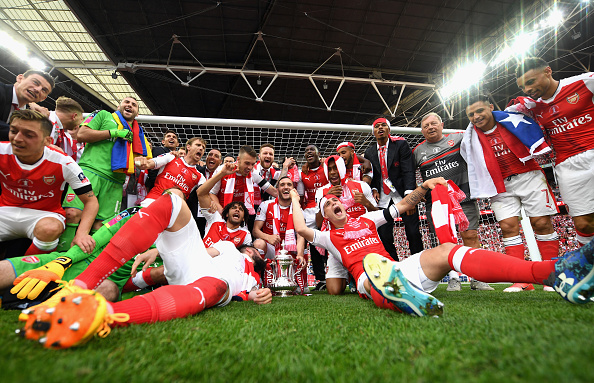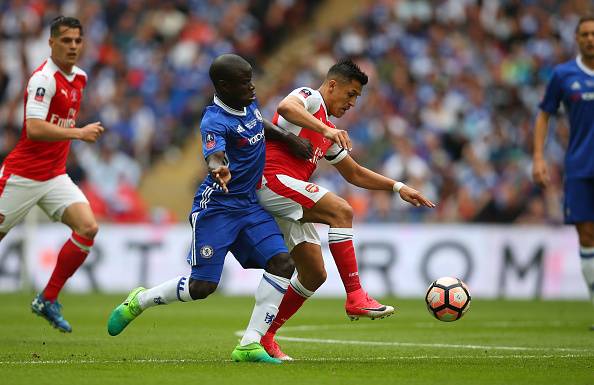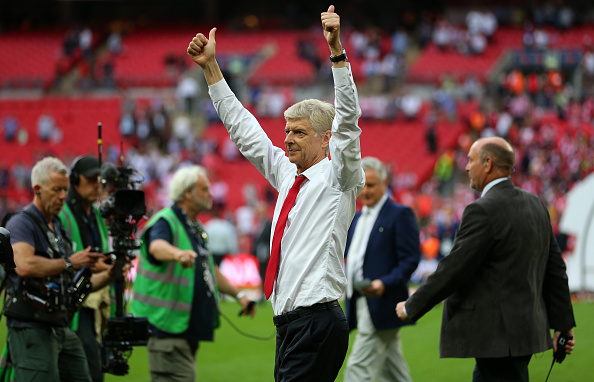
FA Cup Final 2016/17, Arsenal 2-1 Chelsea: Tactical Analysis
Arsenal took home the famous old FA Cup in a thrilling encounter against Chelsea at Wembley Stadium, courtesy of a 2-1 score-line as goals from Alexis Sanchez and Aaron Ramsey outdid Diego Costa’s equaliser.
The odds were heavily stacked against the Gunners ahead of kickoff despite their superiority in the competition (having won eight of the 13 meetings prior). Although Chelsea were going into the game after an excellent league campaign behind them where they won the Premier League title, Arsene Wenger’s men were clearly in the mood to stamp their authority on proceedings.
Arsenal pounced to claim an excellent victory, continuing their affinity with the FA Cup as they won against the 10 men of Chelsea.
The match itself was a tantalising encounter between two well-drilled teams. Wenger’s future was hanging in the balance, but so too was Conte’s ability to be successful on more than one front. After all, before the kickoff, only managers Carlo Ancelotti and Kenny Dalglish had ever won the double in their first season in English football.
So, let’s cast a tactical eye over how the clash panned out – whose tactics won the day, and why?
Incisive Arsenal bypass Kanté and Matic
Playing against N’Golo Kanté and Nemanja Matic can sometimes feel like coming up against three guys instead of two such is the work-rate of the ex-Leicester City midfielder, and so Wenger opted to simply bypass them.
By spreading the play wide and moving possession rapidly through the phases from one-third of the pitch to the next, Arsenal were able to nullify the defensive strengths of both Chelsea’s central midfield pairing.
They simply gave them no time or space to have an impact.
The Gunners could have been three goals to the good inside 30 minutes after they missed two great chances following their opener – the first, a Mesut Ozil chance that was cleared off the line by Gary Cahill and Danny Welbeck missed a sitter at the back post after a fluid counter attack.
The best, however, was arguably Aaron Ramsey’s tap-in opportunity at the back post after Welbeck’s 19th-minute header rattled with the woodwork and rebounded into his path. The Wales international couldn’t react quickly enough to steer home, though.
Despite their lack of clinical finishing, it was a combination of counter-attacking genius and an ability to cut through the Chelsea rearguard when evenly confronted with a wall of blue-shirted defenders that made sure they were able to implement their plan to attack consistently and aggressively right from the first whistle.
Though the north London outfit were lucky to grab the opener, which was surrounded by confusion amid calls for a handball and an infringement in play, there can be no question that they were deserving of their half-time lead.
Also read: FA Cup Final, Arsenal 2-1 Chelsea: 5 talking points
Moving into top gear very quickly, they were able to maintain a high level of intensity throughout the match, and while they found themselves confronted with a more feisty, energetic, and sharp Chelsea side after the restart, they remained capable of playing that killer pass such as when Ozil bamboozled Cahill on the sideline with some clever footwork before sending a pass into the feet of Welbeck with the outside of his boot in the 63rd minute.
Overall, it was Arsenal who broke lines and played a far more direct, expansive game of football to get in behind Chelsea, making the right decisions.
Gunners pressed where it mattered
It was clear right from the very off that Arsenal were set on pressing Chelsea at every possible opportunity.
A lot of criticism has been levelled at Wenger in recent weeks for the way his side missed out on UEFA Champions League football, but huge credit must go to the French gaffer for his choice of brave tactics on such a big occasion for his club. His players did the job he asked them to do and Le Professeur certainly did his homework correctly on the opposition.
While they didn’t go on to dominate the scoreboard as they perhaps should (which hints at some offensive failings), they certainly did more than enough to warrant their famous victory which saw Wenger pick up his seventh FA Cup trophy.
It was a display which saw Arsenal conserve themselves impressively, bursting forward with energy at times, like when Ozil found himself on the edge of the six-yard box in the 87th minute only to see his shot come back off the post. For other periods of the contest, they were content to sit in with determined concentration – repelling attack after attack, stopping the Blues from breaking through on so many occasions.
Indeed, even when the Pensioners did manage to outdo a largely formidable Arsenal defence, Ospina was often on hand to produce remarkable rebuttals of shots, crosses and passes. Ospina’s denial of Costa’s stinging shot which was blasted at him from close range late in the second 45 might have been straight at the shot-stopper, but the keeper’s reactions to parry were still worthy of applause and summed up much of his team’s resilience.
Blues sharpened their knives after blunt start
If critics of Arsenal needed anything more to beat them with, it undoubtedly came in the shape of their concession of Costa’s second-half goal which proved too accurate and precise for Ospina to deal with.
However, 45 seconds after that strike rustled the back of the net, Arsenal’s critics were silenced once again as Olivier Giroud set up Ramsey for what proved to be the match-winner.
Chelsea were much improved for the second half of proceedings, though and huge credit must go to Costa, in particular, for the way he got himself worked up and fired up for his team. He was the focal point for much of their attacks and while he couldn’t muscle his way towards a goal that would have secured extra time at the very least, he did give them hope in the closing stages before ultimately getting substituted by his manager.
Moving the ball more confidently and with greater urgency allowed Chelsea to become a greater threat on the day, but they were made to pay for their earlier lack of those very same qualities.
Willian came on, as did Fabregas, to buoy the 10-man outfit following Victor Moses’ dismissal after his second yellow card of the afternoon.
In the end, though, this was Arsenal’s day.
Ultimately, it was an occasion of vindication for Wenger, a day of victory for him and one that might just prove the catalyst for one last hurrah in the months and years to come. For now, though, the supporters can bask in the glory of denying Chelsea a double and of clinching yet another FA Cup trophy.



